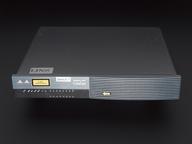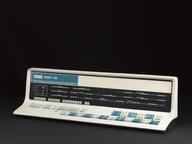

Panel 1 unit from EDSAC1, 1946-1958
- Made:
- 1946-1958 in University of Cambridge
- designer:
- Maurice Wilkes






An example of the unit known as panel 1 from the electronic computer EDSAC 1, designed by Maurice Wilkes and built at the University of Cambridge Mathematical Laboratory, Cambridge, England, 1946-1958.
EDSAC (Electronic Delay Storage Automatic Calculator) was considered to be the world's first fully operational and practical stored program computer. It was built in the Cambridge University Mathematics Laboratory, and contained 3,000 valves arranged on 12 racks, using tubes of mercury for memory. Delay lines were developed for radar during the Second World War, then adapted to be used in early computers. Programs were fed into the machine using punched paper tape, which generated pulses that the computer used to store the program and perform the desired calculation. EDSAC occupied a room of four by five metres. It ran its first program on 6 May 1949. The Lyons Electronic Office (LEO) was based on the EDSAC 1.
Details
- Category:
- Computing & Data Processing
- Object Number:
- 1966-233
- Materials:
- metal (unknown), glass, plastic (unidentified) and resin (unidentified)
- Measurements:
-
overall: 140 mm x 766 mm x 140 mm, 7.37 kg
- type:
- computer equipment
- credit:
- Donated by Dr. Maurice Wilkes




